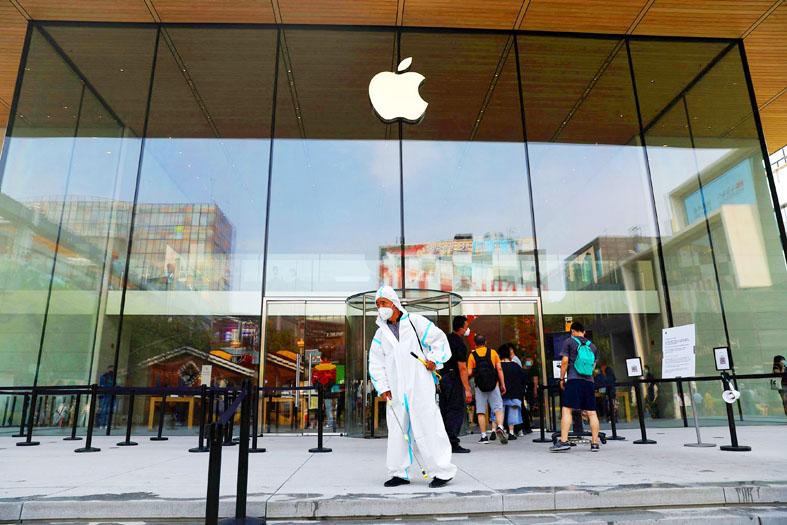Apple Inc yesterday announced a rare retail promotion in China, offering four days of discounts on its top-tier iPhones and related accessories in advance of the launch of its next-generation devices.
The company, usually reluctant to alter pricing, is to take up to 600 yuan (US$88.83) off the price of its top-line iPhone 13 Pro series from Friday to Monday next week, according to a notice on its Web site.
To be eligible, buyers must use one of a select number of payment platforms, such as Ant Group Co’s (螞蟻集團) Alipay (支付寶). Certain AirPods and Apple Watch models are also part of the promotion.

Photo: Reuters
The discounts come as China’s economy tries to bounce back from major COVID-19 lockdowns in business hubs Shanghai and Beijing, which have hurt sales of leading domestic smartphone brands from Xiaomi Corp (小米) to Oppo Mobile Telecommunications Corp (歐珀) and Vivo Communication Technology Co (維沃).
Apple bucked the trend by registering healthy growth in China shipments last month, national data showed, although the discounts suggest even it has surplus inventory heading into the latter half of the year.
Weakening consumer demand, inflation and supply chain issues triggered a 9 percent fall in global smartphone shipments in the second quarter, research firm Canalys said this month. Chinese companies took the brunt of that hit, registering double-digit percentage declines.
Apple has traditionally kept iPhone prices unchanged between generations, although this year’s economic upheaval has already pushed it to one unusual move: raising prices in Japan in response to the drastically weakened yen.
The company offers several payment options in China, including installment plans and lower pricing for students, but it has refrained from discounting its flagship products in the country for years.

MULTIFACETED: A task force has analyzed possible scenarios and created responses to assist domestic industries in dealing with US tariffs, the economics minister said The Executive Yuan is tomorrow to announce countermeasures to US President Donald Trump’s planned reciprocal tariffs, although the details of the plan would not be made public until Monday next week, Minister of Economic Affairs J.W. Kuo (郭智輝) said yesterday. The Cabinet established an economic and trade task force in November last year to deal with US trade and tariff related issues, Kuo told reporters outside the legislature in Taipei. The task force has been analyzing and evaluating all kinds of scenarios to identify suitable responses and determine how best to assist domestic industries in managing the effects of Trump’s tariffs, he

TIGHT-LIPPED: UMC said it had no merger plans at the moment, after Nikkei Asia reported that the firm and GlobalFoundries were considering restarting merger talks United Microelectronics Corp (UMC, 聯電), the world’s No. 4 contract chipmaker, yesterday launched a new US$5 billion 12-inch chip factory in Singapore as part of its latest effort to diversify its manufacturing footprint amid growing geopolitical risks. The new factory, adjacent to UMC’s existing Singapore fab in the Pasir Res Wafer Fab Park, is scheduled to enter volume production next year, utilizing mature 22-nanometer and 28-nanometer process technologies, UMC said in a statement. The company plans to invest US$5 billion during the first phase of the new fab, which would have an installed capacity of 30,000 12-inch wafers per month, it said. The

Taiwan’s official purchasing managers’ index (PMI) last month rose 0.2 percentage points to 54.2, in a second consecutive month of expansion, thanks to front-loading demand intended to avoid potential US tariff hikes, the Chung-Hua Institution for Economic Research (CIER, 中華經濟研究院) said yesterday. While short-term demand appeared robust, uncertainties rose due to US President Donald Trump’s unpredictable trade policy, CIER president Lien Hsien-ming (連賢明) told a news conference in Taipei. Taiwan’s economy this year would be characterized by high-level fluctuations and the volatility would be wilder than most expect, Lien said Demand for electronics, particularly semiconductors, continues to benefit from US technology giants’ effort

‘SWASTICAR’: Tesla CEO Elon Musk’s close association with Donald Trump has prompted opponents to brand him a ‘Nazi’ and resulted in a dramatic drop in sales Demonstrators descended on Tesla Inc dealerships across the US, and in Europe and Canada on Saturday to protest company chief Elon Musk, who has amassed extraordinary power as a top adviser to US President Donald Trump. Waving signs with messages such as “Musk is stealing our money” and “Reclaim our country,” the protests largely took place peacefully following fiery episodes of vandalism on Tesla vehicles, dealerships and other facilities in recent weeks that US officials have denounced as terrorism. Hundreds rallied on Saturday outside the Tesla dealership in Manhattan. Some blasted Musk, the world’s richest man, while others demanded the shuttering of his